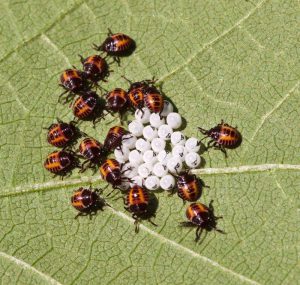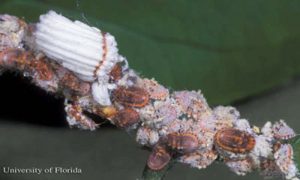
We have seen a little winter for the first time in several years, but don’t fret spring is almost here! As the weather warms up, pests that were basically hibernating in the egg or pupal stage will emerge as adults from their overwintering sites which can include structures, under leaf debris, in burrows, under rocks or even under bark. Once the insects hatch or emerge they will want to get continue their life normal cycles.
Just as I did a week ago, you may come home from work one day and find hundreds of lady beetles or some stink bugs flying around beating the outside of your home or in windows trying to get out. Lady beetles are a “good bug” and feed on plant pests such as aphids and mealy bugs. They don’t normally bite, but if they feel trapped you may get a little pinch. Stink bugs feed on different types of plants and they do not bite people. The problem with stink bugs and other pests emerging is that they will wreak havoc on your landscape and vegetable plants if they reproduce and get their numbers up just as new growth on our plants begins to grow in the spring. Some of these pests lay hundreds of eggs at time, while others can actually have live births.

Scale insects and mealybugs will attack many Florida plants including citrus, avocado, carambola, fig, guava, mango, soursop, and sugarcane; vegetables including asparagus, beans, beets, cabbage, peanuts, pigeon pea, cucumber, lettuce, pepper, pumpkin, and tomato; forest trees, and many species of ornamental plants including Allamanda, Angelica, Anthurium, Bougainvillea, Croton, Dieffenbachia, ginger lily, Heliconia, Ixora, hibiscus, palm, pothos, and oleander just to name a few. Scale insects are a hard bodied insect that has an outer shell making them difficult to treat and kill. Mealybugs are soft-bodied scale insects with piercing-sucking mouthparts and a white, waxy thread covering. Mealybugs feed on the plant and leave a sticky residue called honeydew on the foliage, which usually promotes the growth of the black sooty mold fungi. This black coating may be unsightly but can be washed or rubbed off and is generally harmless to the plant. Aphids also produce honeydew and infested plants may also have sooty mold. Another sign that you may have these pesky insects is if you see a trail of black ants going up the side of your plants, as they too like to feed on the honeydew excretions.
So, what do we do about pests that overwinter in our landscape? First, we scout and look for their arrival; next we identify them and make sure we know what pest we are working with. For example, although lady bugs may arrive in large numbers, they are a beneficial insect in our garden so we don’t want to do anything to harm them! Lastly, if we do identify problematic insects, we want to treat them in the safest way possible, which can include using a horticulture oil or insecticidal soap spray. Be sure to always follow the label instructions when using any pesticide product, the label is the law! If you need help identifying your insects, please contact your local extension office, you can email us pictures or bring in samples. Additional resources include http://edis.ifas.ufl.edu/ch195 and edis.ifas.ufl.edu/mg005 For more information or to register for programs call 352-671-8400 or email maxine32666@ufl.edu
 0
0
